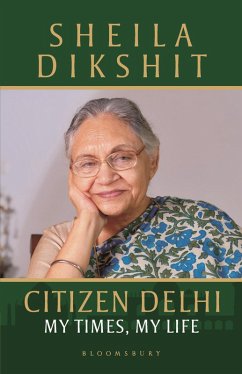The girl who loved cycling along the tree-lined avenues of a brand new Lutyens' Delhi could never have dreamt that five decades later she would govern, and transform, Delhi as its chief minister - not once, but thrice consecutively.
When a politician like Sheila Dikshit, with a career spanning over three decades, chooses to let the reader get a glimpse of her life's journey, the opportunity brings along an element of surprise. In a fascinating account of her life, contoured along the life of the nation and her political party at critical junctures, she creates a richly patterned universe with deft touches, seamlessly moving between the home and the world, the past and the present.
Be it encounters with politics, which she terms 'life at its barest' or the ups and downs of a household, what shines through is the portrait of a modern woman determined to face any eventuality with fortitude, and a deep sense of duty.
Interestingly, she never wanted to be in politics, but destiny willed otherwise - a destiny shaped by her liberal upbringing in a Punjabi household. Brought up to be independent, she chose her life partner from another part of India. And that started it all.
As the wife of an IAS officer and daughter-in-law of well-known freedom fighter and politician, Uma Shankar Dikshit, with his long association with the Nehru-Gandhi family, she saw governance from both ends. When she began assisting her father-in-law from 1969, her up-close view of politics eventually became a springboard for her own entry into the arena in December 1984, inaugurating a 30-year-long career in politics. The narrative foregrounds a question that the author considers crucial for democracy - how does one deal with the constant tussle between the dictates of governance and the here-and-now preoccupations of party politics?
Hinweis: Dieser Artikel kann nur an eine deutsche Lieferadresse ausgeliefert werden.
When a politician like Sheila Dikshit, with a career spanning over three decades, chooses to let the reader get a glimpse of her life's journey, the opportunity brings along an element of surprise. In a fascinating account of her life, contoured along the life of the nation and her political party at critical junctures, she creates a richly patterned universe with deft touches, seamlessly moving between the home and the world, the past and the present.
Be it encounters with politics, which she terms 'life at its barest' or the ups and downs of a household, what shines through is the portrait of a modern woman determined to face any eventuality with fortitude, and a deep sense of duty.
Interestingly, she never wanted to be in politics, but destiny willed otherwise - a destiny shaped by her liberal upbringing in a Punjabi household. Brought up to be independent, she chose her life partner from another part of India. And that started it all.
As the wife of an IAS officer and daughter-in-law of well-known freedom fighter and politician, Uma Shankar Dikshit, with his long association with the Nehru-Gandhi family, she saw governance from both ends. When she began assisting her father-in-law from 1969, her up-close view of politics eventually became a springboard for her own entry into the arena in December 1984, inaugurating a 30-year-long career in politics. The narrative foregrounds a question that the author considers crucial for democracy - how does one deal with the constant tussle between the dictates of governance and the here-and-now preoccupations of party politics?
Hinweis: Dieser Artikel kann nur an eine deutsche Lieferadresse ausgeliefert werden.









